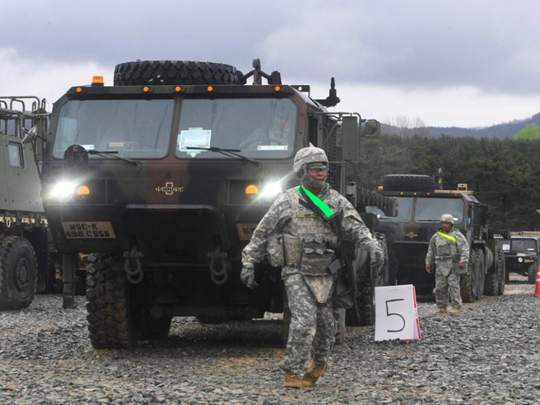
As US Vice-President Mike Pence visited the Demilitarised Zone separating the two Koreas, media outlets around the world weighed in on the tense stand-off between the US and North Korea.
“As a candidate, Donald Trump seemed to pay no more attention to North Korea’s accelerating nuclear weapons programme, which his predecessor has warned is America’s most urgent threat, than he did to other complex foreign policy issues,” said the New York Times. “Now he is paying attention, but not in a helpful way. His intemperate talk is adding to regional tensions, unnerving allies and likely reinforcing North Korea’s long-standing fear that it could one day be attacked by America — the very reason North Korea invested in a nuclear arsenal in the first place,” the paper said.
It felt that it would be risky for Trump “to let overconfidence and bombast, expressed in tweets and public statements, box him into some kind of showdown with the North’s ruthless leader, Kim Jong-un, who has displayed similarly macho traits,” and observed that South Korea, Japan and even Russia have urged both sides to avoid a devastating miscalculation. “What’s missing in the White House is a coherent strategy, something beyond statements and asking China for help. Mr Trump needs to be firm, not reckless in his talk, ratchet up sanctions and find a way to engage the North in negotiations,” it said.
The Guardian, meanwhile, was relieved that the apparent failure of a North Korean missile launch on Sunday “seems to have allowed the threat of a catastrophic war to recede”. Noting that neither Trump nor Kim Jong-un had backed down, the paper said in an editorial: “Yet neither has been forced into delivering on his threats. This may have been the best possible outcome of the crisis in the short term, but it was a remission, not a cure. The underlying and apparently insoluble conflict remains and there is little sign of the kind of clear and careful thinking on either side, which will be needed to scale it down.”
The paper said while the North Korean regime was “a ruthless tyranny with a clear aim in view,” the US president was “vainglorious, sentimental and unpredictable” in his strategy. “Mr Trump tweeted last week that ‘North Korea is looking for trouble. If China decides to help, that would be great. If not, we will solve the problem without them! USA’.” Lamenting the lack of tact and diplomacy in the White House, the paper quipped: “There was a time when we asked whether the president of the USA could be trusted with his finger on the nuclear button. Now we have to worry as well whether he can be trusted with a mobile phone.”
The Globe and Mail on the other hand focused on the critical role of China and said: “American presidents and other foreign leaders have long wanted China to help solve the North Korean problem. But China is cautious when it comes to its rebellious neighbour and has been reluctant to rein it in, even in spite of its recent ballistic-missile tests and boasts of nuclear capability. So Mr Trump’s undiplomatic tweet may have been useful. The same goes for the American aircraft carrier group — what Mr Trump calls a very powerful “armada” — currently heading to the Korean peninsula... The inexperienced and blunt Mr Trump has may have succeeded in getting China to be more forthright about the threat posed by North Korea.”
In Japan, the Mainichi daily dragged itself into the debate and said: “Manufacturing dangerous conditions to obtain a more advantageous negotiating position is one of North Korea’s most well-worn diplomatic strategies. It appears that the North’s leader Kim Jong-un is playing a similar diplomatic game, speeding up the regime’s missile and atomic weapons development programmes from his father’s time in a bid to confront the United States as an equal.”
In the context of the current stand-off, the paper also raised concerns that with a recent cruise missile attack on a Syrian government airbase and the dropping of the ‘Mother of all Bombs’ on a Daesh (self-proclaimed Islamic State of Iraq and the Levant) target in Afghanistan, the Trump administration is showing the world that it will not hesitate to use force.




_resources1_16a31069e4e_small.jpg)






